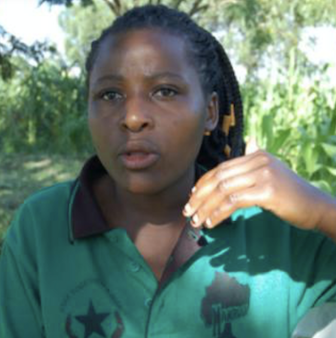Ugandan women are fighting for their forests - and their lives.
Discussion details
Illegal charcoal burners in Uganda had better watch out. Fed up with seeing their community forests trashed, local women are getting together to protect the natural environment and put a stop to rampant deforestation.

“If they destroy the forests, we suffer the consequences,” says Martha Kabazora, a small-scale farmer who works the land near Matiri central forest reserve in Kyenjojo district, around 200 km west of the Ugandan capital Kampala. “Commercial charcoal burning encourages indiscriminate tree cutting and the illegal practice of felling endangered tree species.”
Martha leads a local Village Savings and Loan Association (VSLA) called Manruia (Matiri Natural Resource User and Income Enhancement Association), supported by CARE International and Joint Effort to Save the Environment (JESE), a Ugandan NGO set up 20 years ago to help rural communities protect the forests and wetlands near their homes. “People should be encouraged to start other income-generating activities and stop looking at forests as their sole sources of income because many forests in Kyenjojo have been destroyed,” she adds.
“Unfortunately, charcoal is big business in Kyenjojo. People need to be aware of the importance of planting new trees, and replacing those that have already been cut down. The government and its development partners should work jointly towards encouraging people to embrace diverse energy sources.”
Poverty and the lack of decent jobs is often a driver of deforestation. Gilbert Kato, a charcoal dealer in Matiri, says it’s difficult for locals to completely give up on charcoal burning despite its negative effects on the environment. “Charcoal yields quick money to enable them to support their families instead of struggling for loans,” he says.

According to JESE, hundreds of charcoal producers and dealers have already been evicted, and thousands of bags of charcoal seized and destroyed - but the illegal trade continues. Martha’s friend Janet Kabajulizi, who is also a member of Manruia, says raising awareness is key. “We have teamed up to protect the forest, and we have been carrying out sensitisation meetings where we ask people to stop degrading the environment,” she says.
But the women face serious challenges - and not just from the illegal logging and charcoal gangs. According to Support for Women in Agriculture and Environment (SWAGEN), another Ugandan NGO, women remain effectively excluded from participating in decision making and have no access and no control over productive resources such as forests. Women also tend to be harder hit by the impacts of climate change, poverty, and water and food insecurity.
When it comes to reforestation, explains Gaster Kiyingi, team leader at Kampala-based NGO Tree Talk Plus, women are at a significant disadvantage. “When women plant trees, their husbands, who own the land, sell all the trees when they grow. This makes women lose the morale to plant more trees because they know they will not benefit from them. Even when a woman plants trees, they do not belong to her; they belong to the owner of the land, who is a man,” says Gaster.
Now, however, there is hope that forest governance including women's effective will be given a real boost through the new Forest Partnership between the European Union and Uganda, part of the EU’s Global Gateway strategy. The partnership is one of five signed at the UN COP27 climate talks in November last year, aimed at the protection, restoration and sustainable use of Uganda’s forests. A ‘gender mainstreaming manual’ has been produced by SWAGEN and the FAO-FLEGT programme which aims to “enhance women’s participation in forest governance and ensure equitable access to forest resources and their associated benefits.”
“Gender-responsive forest governance involves a deliberate focus on the ways in which gender informs perceptions and usage of forest resources, relationship with and knowledge about forests, and tenure security over forest resources,” says Irene Kambedha, Senior Forestry Officer and Gender Focal Point Officer at Uganda’s Ministry of Water and Environment. “Understanding these aspects paves the way for women’s participation in decision-making, resource management and benefit-sharing. Women and children are most likely to feel the effects of forest degradation and climate change. This gender mainstreaming manual will be important to mitigate these effects.”
Despite the challenges, Ugandan women have a proud track record of success when it comes to sustainable farming and protecting the environment. Diversifying into alternative income streams - such as honey, pine resin, mushrooms or shea nuts - gives them independence and increases their climate resilience.

Matiri farmers Mary Kobusinge and Martha Ayabare used loans from the Manruia VSLA to launch new careers as honey producers. “We have benefitted a lot from the central forest reserves by setting up beehives where we harvest honey which we sell and get money from,” says Mary. “With the ten beehives I set up, I have been able to harvest honey which I sell to customers in Kampala and earn money,” adds Martha. “I can now appreciate the benefits trees. We also go to the forest and harvest papyrus which we use to make hand crafts and sell as a group.”
Sources :
- https://www.fao.org/in-action/eu-fao-flegt-programme/en/
- https://spgs.mwe.go.ug/improving-women%E2%80%99s-participation-good-forest-governance-uganda
- https://swagenafrica.org/program-areas/gender-justice-through-economic-development-climate-justice/
-
https://issuu.com/jese_uganda/docs/jese_2019_progress_report_low_res_web_version
Photos © JESE
Log in with your EU Login account to post or comment on the platform.